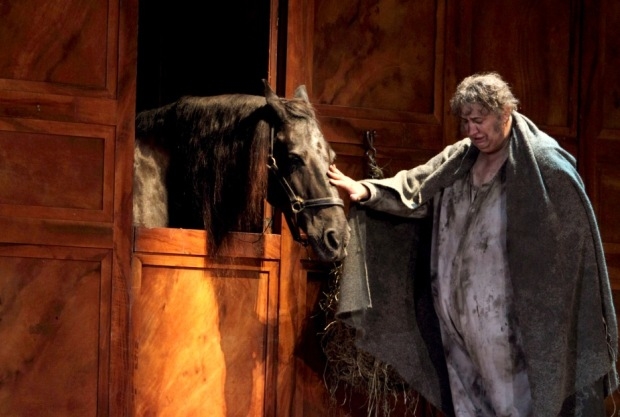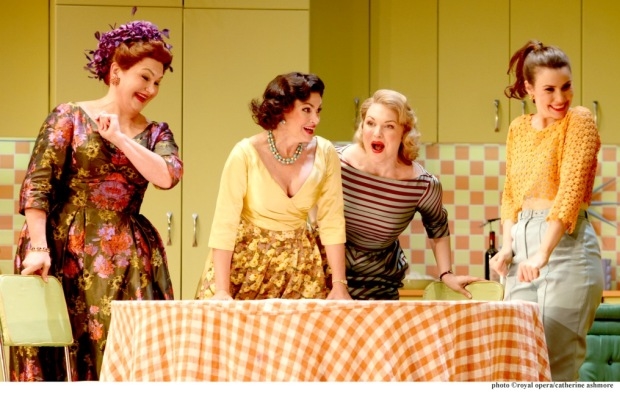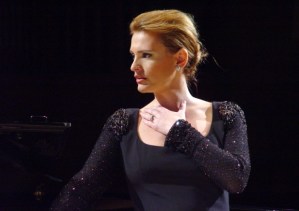Falstaff (Royal Opera House)
Covent Garden revives its jolly ’50s production of Verdi’s farewell to opera

© Catherine Ashmore
It’s been a switchback year for the Royal Opera, but it's ending the season — as Verdi ended his career — with a comedy. This first revival of Robert Carsen‘s take on Falstaff is decently staged and sweetly delivered, the closest we get to Covent Garden's recurring ugliness of neon strips being the elegantly concealed lights in Alice Ford’s spotless kitchen.
By coincidence, only a few days earlier in Aix-en-Provence I’d caught a revival of Carsen’s other comic Shakespearean production, his 24-year-old A Midsummer Night’s Dream (a gem now lost to London, sadly, since ENO opted for message over magic in Britten’s opera). Whereas the younger Carsen showed his surest comedy chops in that, there are moments in Falstaff where his older self misses the mark.
He likes a dominant colour, though, and the order of the day is brown. Paul Steinberg‘s sets favour walnut panelling, with the Garter Inn rendered as a horsy London club within whose walls the squalid man-mountain that is Sir John Falstaff gorges on room service as if there were no tomorrow, abetted by the servile Bardolfo and Pistola — a smart double-act by Alasdair Elliott and Lukas Jakobski, both veterans of the initial run in 2012.
There’s a first-rate company of women to rattle the old man’s cage. Kai Rüütel returns as Meg Page, Agnes Zwierko channels Patricia Routledge as Mistress Quickly and Ainhoa Arteta as Alice Ford runs the whole scam with dynamic decisiveness. All three characters are rounded and well drawn, not to say sung with great attack and a sure sense of Verdian flair.

© Catherine Ashmore
The d’Artagnan figure to these female musketeers is Alice’s daughter Nannetta, who is forcibly betrothed to seedy old Dr Cajus (the tireless Peter Hoare, complete with comb-over to mark him out as a loser), and Anna Devin is, well, divine in the role. This alumna of the Jette Parker Young Artists scheme who dazzled in so many small roles during her residence has blossomed into a radiant soprano, confident and complete, and her Fairy Queen’s aria steals the evening.
As her true love, Fenton, current JPYA Luis Gomes equals Devin for lyric beauty, while Roland Wood makes a good role debut as angry Mister Ford, vocally secure if not yet as interestingly engaged as he might be.
In the absence of Louis the Horse from the second performance of this brief five-show run (a victim of tube-strike gridlock, apparently) Falstaff assoluto Ambrogio Maestri had the glory to himself. The veteran of 250 performances worldwide, including this production’s initial run, raises the evening to another level with his every larger-than-life appearance. So brilliant is Maestri’s comic touch that it’s easy to overlook the sheer beauty of his singing.
Michael Schønwandt conducts with a vitality that occasionally tips into over-excitement (the brief introduction to act three sounded aggressive rather than spirited), yet he ensures there's still an early-season freshness to the ROH Chorus and Orchestra.
Carsen’s production has been revived by Christophe Gayral, and they can decide between them who’s responsible for its too-broad moments. There are certainly a few things that need tightening up. Ford’s helpers don’t search the kitchen cupboards, they just throw things out for empty effect; in act three Maestri climbs onto the long table for no other reason than to roll along it. But hey, the show zips merrily by, so let's raise a cup of sack to them all.













